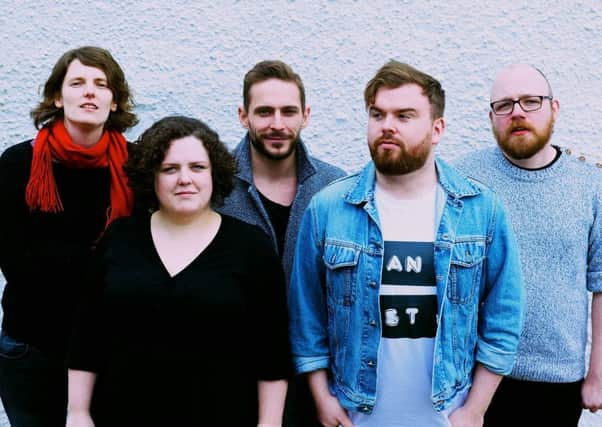Album reviews: Kid Canaveral | NAO | Elvis Presley


Kid Canaveral: Faulty Inner Dialogue | Rating: *** | Lost Map
NAO: For All We Know | Rating: *** | RCA
Elvis Presley: Way Down In The Jungle Room | Rating: *** | Legacy
Advertisement
Hide AdAdvertisement
Hide AdBut Kid Canaveral have put the tune and the sentiment and the cottage industry ahead of the pose and the effects pedal and the tour shenanigans, releasing two thoughtful but unpretentious albums to date. For their third crack of the whip, they have added a keyboard player to their line-up and the possibility of a whole new shimmering synthesised soundscape has opened up before them.
You can hear the difference almost immediately on opening track Gun Fhaireachdain with its subtle glitchy backdrop. There’s no wham bam electro epiphany – these kids play fair with their new toys. But they become bolder on Pale White Flower where tolling guitar, fuzzy Moog synths and propulsive drumming combine to create a meatier piece with an iridescent gleam.
The demure cut glass vocals of guitarist Kate Lazda feature on a couple of tracks. First, she revisits her anxiety dreams on Callous Parting Gift. Then she’s leaving home on Listen To Me, capturing the frisson but also dislocation of moving to the big city in the most bittersweet terms.
For the most part, though, it is frontman David MacGregor’s disquiet which drives the album. The title First We Take Dumbarton might raise a smile but he is deadly serious in taking aim at a culture of dehumanisation and demonisation at home and abroad on this track and the sparkling, poetic From Your Bright Room.
He turns his apprehension inwards on Lifelong Crisis Of Confidence, reckoning “the view from a distance is always clearest”. It’s the kind of hookline which Biffy would bash to smithereens and Chvrches would pour some sugar on; Kid Canaveral go for clear, ringing guitars and a matter-of-fact delivery.
NAO is a much-touted soul soprano from East London, who is a bit more Minnie Riperton rapture than Mariah Carey dog whistle in her singing style. But the underwhelming songs and bloodless, minimal electro backing throughout much of her overlong debut album drains any potential sensuality from her tone. The flinty tech funk of Trophy is more a jam than a song. She is better served on Bad Blood, where her soft strains are complemented by the hard electro funk backing, and the tender ballads Blue Wine and Feels Like (Perfume) allow her to spread her wings more freely.
Way Down In The Jungle Room is a compilation of Elvis Presley’s final studio recordings, made in 1976 at home in the famed recreation room of Graceland, and previously released on the From Elvis Presley Boulevard, Memphis, Tennessee and Moody Blue albums. Late period Elvis has its advocates but it’s hard to get beyond that scenery-chewing delivery which launched a legion of pub singers or the overcooked easy listening croons such as The Last Farewell, so of its time with its swirly, schmaltzy orchestration.
Advertisement
Hide AdAdvertisement
Hide AdA second CD of outtakes for the forensically minded fan is notable for capturing some of the fun and spontaneous energy generated by Presley and his band, and the occasional superior rendition of songs such as It’s Easy For You, a lesser known Tim Rice/Andrew Lloyd Webber number which fits snugly into Presley’s repertoire. Fiona Shepherd
CLASSICAL: Novus Quartet: Webern, Beethoven & Yun | Rating: **** | apartemusic.com
The biggest test for any string quartet is surely Beethoven. And so it is that the one Beethoven Quartet (Op.95 in F major) on this fascinating disc by the Novus Quartet from South Korea is a defining centrepiece. Their playing is explosive and gripping, igniting the opening movement with compelling theatricality almost to the point of total euphoria.
Is there a softer side to their musicality? It seems so. The second movement is warm and expressive, the third earnest but playful, the finale beautifully languid in the opening largo, and deliciously fitful in the agitated allegretto.
Around this monument to quartet-ism, Webern’s early Langsamer Satz is profoundly sublime, and Isang Yun’s String Quartet No 1 is a curiously attractive fusion of East-West styles. This is an extremely interesting young ensemble. Ken Walton
JAZZ: Tommy Smith / BBC Scottish Symphony Orchestra: Modern Jacobite | Rating: **** | Spartacus Records
Tommy Smith has ventured into the realms of orchestral composition in the past, but Jacobite is his first composition on a symphonic scale.
Advertisement
Hide AdAdvertisement
Hide AdFeaturing the BBC SSO under the baton of Clark Rundell, the album opens with Smith’s tenor sax set against lush strings in Rachmaninoff’s Vocalise. This stormy orchestral introduction eventually gives way to calm into which Smith’s rich-toned sax – the “main narrator” – enters with unhurried elegance.
The middle movement opens with Smith playing recurring snatches of a catchy Gaelic theme, while the third has suitably violent outbursts, followed by brooding lamentation.
There is much to enjoy here, and any historical gloom is counteracted by Smith’s vivid re-imaginings of Chick Corea’s beguiling Children’s Songs. Jim Gilchrist